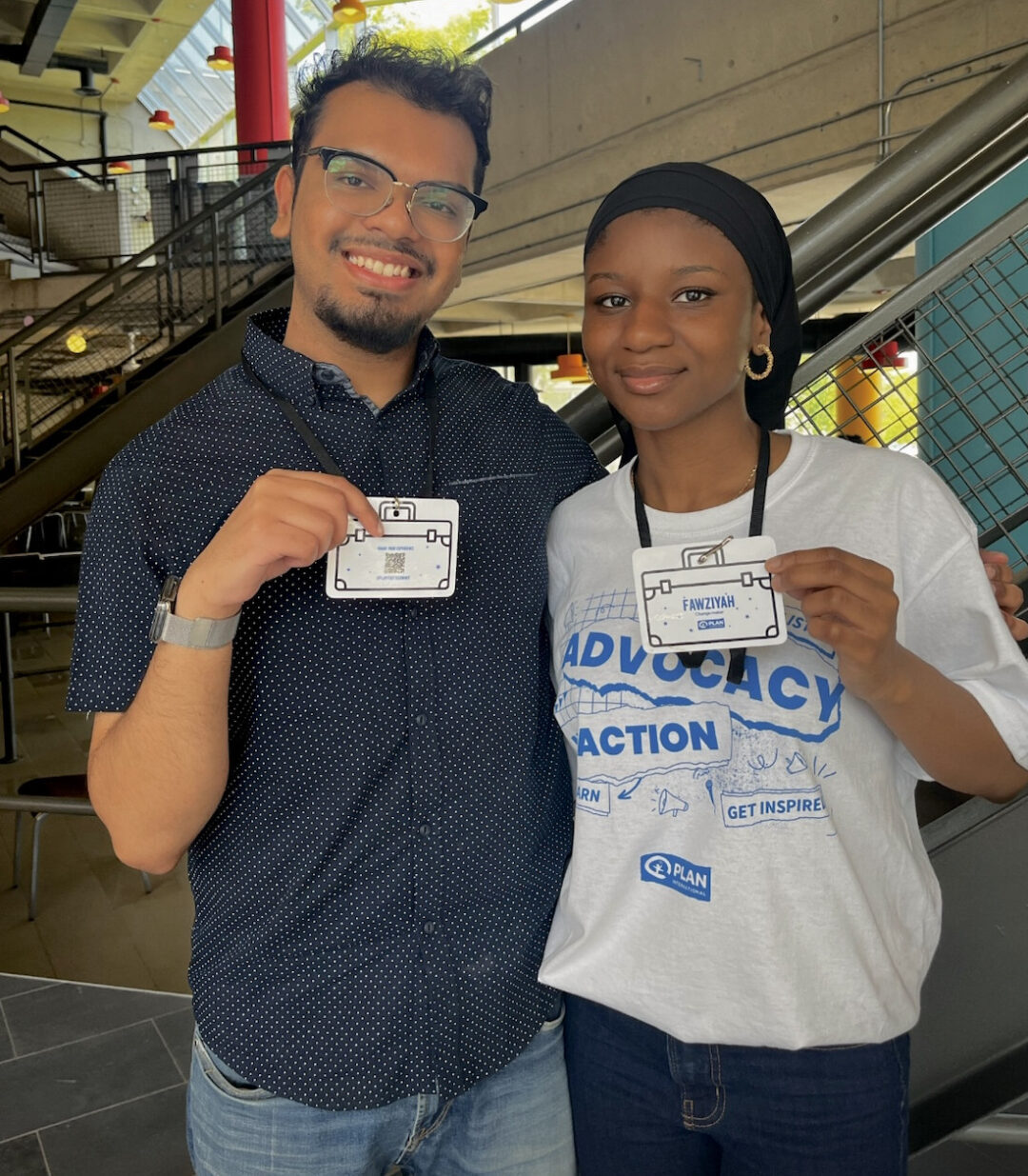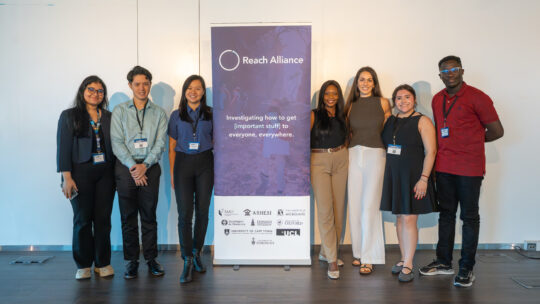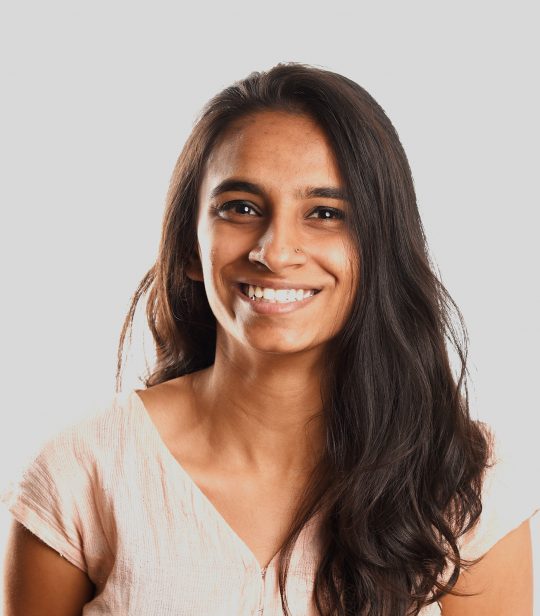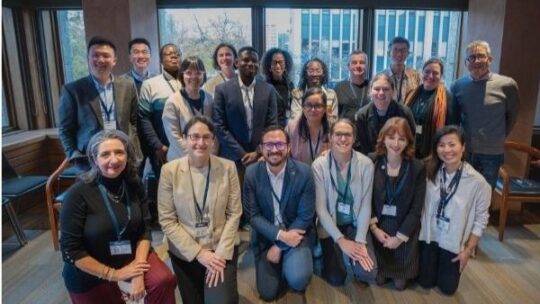At the end of May, University of Toronto student researchers Fawziyah Ibrahim and Adib Syed attended the Plan International Canada Youth Summit in Toronto. Created by youth for youth, this Summit is an advocacy enhancer for up-and-coming change-makers. Over four days, Fawziyah and Adib participated in interactive sessions led by youth, explored ideas on how to create change for the world’s most pressing issues, and expanded their advocacy and leadership skills. Read what they had to say about their experiences.
Fawziyah, what is your biggest takeaway from participating in the Summit?
My biggest takeaway from participating in the Summit was the immense power of youth voices and the importance of youth engagement in driving positive change. Witnessing the passion, dedication, and innovative ideas of young advocates from diverse backgrounds inspired me and reinforced my belief in the transformative potential of youth-led initiatives. Youth engagement and advocacy are not only essential components of research and development but also powerful catalysts for social change.
Adib, what is your biggest takeaway from participating in the Summit?
The most important lesson I took away from taking part in Plan International’s Youth Summit is that no action is too little to contribute to resolving some of the most pressing social problems facing our planet. The sheer number of social problems in our world can frequently leave one feeling overwhelmed and helpless. It is common to believe that as individuals, we are helpless to address these problems because only those who are in positions of power, authority, and with resources on a larger scale can do so. My experience has taught me that raising awareness of the issues one is passionate about is one of the simplest yet most important ways to begin acting. Many members of the general public may not be aware of the problems or the severity of the problems that exist in our world; however, increasing their awareness of such problems inspires people to unite and advocate for change by applying pressure to those in positions of authority rather than just waiting for them to act.
Furthermore, I discovered that as young changemakers in today’s world, we have access to a variety of resources, including social media and various art forms and storytelling techniques, which enable us to educate more people about social issues by raising awareness of them in an engaging manner. Although it may seem as though the world is headed towards a dystopian future, no effort is too little to address these problems, and young people today are better informed and have access to resources than ever before to strive towards a better and more equitable world.
Fawziyah, what did you learn about youth engagement and/or advocacy that will shape how you engage with stakeholders around your case study research?
The Summit provided valuable insights into effective youth engagement and advocacy strategies that will significantly shape how I engage with stakeholders around my case study. I learned the importance of inclusive and participatory approaches that involve youth as active partners and decision-makers. Given the nature of our case study, our primary audience consisted of well-established industry experts, therefore I hadn’t taken into consideration youth involvement in financial inclusion. This is important because actively engaging young stakeholders can ensure that their perspectives and experiences are fully considered, fostering ownership and sustainability of SACCO program’s outcomes. Additionally, the Summit emphasized the power of storytelling and effective communication in engaging stakeholders and knowledge translation/dissemination. I realized the importance of using compelling narratives and evidence-based arguments to convey the significance of financial inclusion for youth and non-youth, and the potential impact on their lives and communities. By effectively communicating the findings and recommendations of our research in different avenues, we can raise awareness, foster dialogue, and inspire action among stakeholders, including policymakers, financial institutions, and community members.
Adib, what did you learn about youth engagement and/or advocacy that will shape how you engage with stakeholders around your case study research?
I discovered that advocacy is extremely interdisciplinary and that many social issues are cross-sectoral. Even though Plan International advocates for child human rights and gender equality, many summit participants I met were working on other issues, including climate change, homelessness, and even my own work as a researcher who focuses on social determinants of health. Similarly, using this cross-sectoral framework, my team (a quick shoutout to my wonderful team members Gabrielle, Megan, Pritika, and Yufeng as well as our amazing mentor Dr. Leanne De Souza-Kenney!) investigated childhood obesity from a variety of angles, including how businesses, the agriculture sector, the ministry of education, non-profit organizations, academics, and health professionals could prevent and reduce it in Barbados. To properly address this intersectoral issue, we must address the root causes of childhood obesity in all domains, not just the health sphere. By concentrating exclusively on the health sector, we would have lost out on how other sectors are trying to reduce childhood obesity. We intend to present our case study to the interviewees from the many fields they work in once it is complete in the hopes that this will encourage other sectors to also think about taking acting and initiatives to reduce childhood obesity rates not only in Barbados but across the globe as well.
We are so thrilled to have had our Reach researchers connect with likeminded individuals and deepen their awareness and knowledge of global issue while building their leadership and advocacy skills to unleash their power as global citizens.




